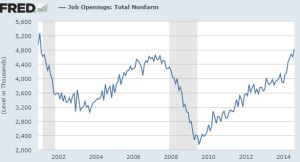Since the 2008 financial crisis, the labor market in the U.S. remains horrible. Nearly 7 years later:
- Record levels of people on food stamps is not decreasing (over 40 million families)
- Duration of unemployment is still double what it used to be (at 31 weeks right now)
- The labor participation rate has fallen to a 40-year low (under 63%)
- Unemployment duration is the longest since World War II
Alongside of the difficulties in finding work, there is an anomaly that job openings have recovered and have now surpassed the pre-2008 levels. There are currently 4.8 million non-farm open positions. How can there be so many unfilled positions with so many people looking for work? This disconnect is called a “labor market skills mis-match.” People who are looking for work do not have the skills that are needed for the positions that are open.
There is a gap between the skills that the unemployed have and the skills that employers are seeking. Experts have suggested that people who lost their jobs pre-2008 could get work related to the real estate boom (construction, mortgage broker, etc.). Those jobs did not require a high level of skill, however, far fewer of those jobs are available today.
The critical element for your employment is to keep your skill set current. Your set of skills that you offer employers needs to stay in alignment with the changes in your industry. You should periodically review your industry for its attractiveness:
- Is your industry growing or shrinking globally? How about in your country or region?
- Are processes changing in your industry and are you keeping up with those changes?
- Is there a disruptive technology or company that may damage or eliminate your company?
- Is there a disruptive technology that may eliminate your position or current skills?
- Are you increasing your skill level with certifications or degrees to increase your value?
To maximize your career trajectory, you need the skills that will increase your desirability to employers. This requires on-going adjustments throughout your career to make sure you are in the best industry, with a best employer, offering opportunities for your development and advancement. By doing this you are simultaneously minimizing your risk of falling into the skills-gap of a long stretch of unemployment.

